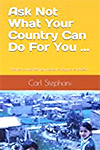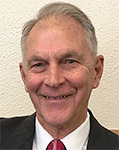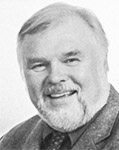Review — ASK NOT WHAT YOUR COUNTRY CAN DO FOR YOU by Carl Stephani (Colombia)
 Ask Not What Your Country Can Do For You …: Peace Corps Remembered – Bogota 1962–64
Ask Not What Your Country Can Do For You …: Peace Corps Remembered – Bogota 1962–64
by Carl Stephani (Colombia 1962–64)
Independently published
June 2022
237 pages
$6.95 (paperback)
Reviewed by John Chromy (India 1963–65)
•

Carl Stephani
Our 1960s Peace Corps colleague Carl Stephani has assembled a very interesting and readable screed that for first decade PCVs will bring back many memories, and for post-1970 PCVs.
Ask Not . . . provides an interesting view of Peace Corps in the “Olden Days”
- The days when Peace Corps training included 2-3 months at a US University, a month of outward bound hiking/mountain climbing/river swimming and a week or two in the cross-cultural setting of a poverty ridden neighborhood, be it urban slum or rural Appalachia, migrant stream camp or Native American reservation.
- The arrival in country and three days later delivered to the village or neighborhood of your assignment.
- The days when little or no advance program planning had been done by PC staff at each site and the Volunteers were expected to explore their community, determine felt needs and design their work program in response to the community’s needs and opportunity.
- The days when Peace Corps Programs were actually planned and administered by contracted agencies, in this case CARE, rather than by Peace Corps staff.
Carl’s book is mostly based on the letters he sent to his family from July 1962 through August of 1964, and from his recollections now some fifty plus years later. Much of it is direct quotes from the letters with Carl providing some of the context and/or bridge narrative that ties it all together. Included are numerous black and white photographs of his host community, living quarters and work in the Bogota Barrio El Carmen, an informal neighborhood of some ten thousand people who had moved to Bogota to escape the violence and poverty of their homes out in the country.
His monthly letters home provide amazing insight into a Volunteer’s excitement upon arrival in his assigned community, the many challenges faced in getting introduced to the community, and the logistics of finding housing, and setting up a food and water supply system. Sequentially the letters follow-up with the discouragement of the first few months when Carl and his colleagues have not yet established a program of work, are faced with a corrupt and ineffective communal Junta, and what appears to be apathy towards community-wide projects amongst 99% of the residents. The third month of service is way too early for Carl to understand that for barrio residents, the struggles of daily life leaves little time, energy and will to work on community programs.
In subsequent months the PCVs help the community educate the populace on the importance of electing competent people to the El Carmen junta. The election is a success, the new junta mobilizes the community to clean out streetside drainage ditches and a miasmic lagoon, which were sources of filth, foul odors and disease affecting the daily life of thousands of people.
Carl’s letters in the eighth month reflect the exhilaration of community weekend work projects involving hundreds of people, yet in the tenth month the letters again reflect the dismay and boredom of post-community project doldrums. Having Achieved one major successful project, the residents went back to carrying out their daily lives and unlike the PCVs were not ready to mobilize for the many community improvement ideas placed before them.
Mixed in with all this, the letters reflect the many phases of a PCVs interests and concerns: stretching their living allowance, awaiting packages from home, taking vacations on a mountain ranch, getting little help from the CARE and PC staff, attending a few embassy receptions and dancing at the many community and family fiestas.
In the latter months the letters reflect Carl’s concerns about “What am I going to do after Peace Corps? Should I go to graduate school, apply to the Foreigh Service, ride a motorbike across South and Central America, bum around the world with my friend who is stationed in the Philippines. You will have to read the book to find out how all these notions and aspirations played out.
Ask Not . . . is not a super exciting or page turning read. That said, Carl’s having published the gist of his many letters and photographs provides a unique and valuable insight into the early days of Peace Corps’ Urban Community Development program in the cities of South America —a programmatic effort that Regional Director, and later Press Secretary for Senator Robert Kennedy Frank Mankiewicz, described as El Punta de Lanza for hope filled change and progress in poverty enmeshed communities. For the PC Volunteers clearly this marginally structured program was tough duty indeed.
That said, I noted some really interesting elements in Carl’s PC/Colombia experience; Two that really jumped out at me 1) male PCVs had to wear suits and ties in the community work, because in those days all the respected men in the communities wore suits; 2) Male PCVs in Latin America had the luxury of meeting, dancing with and often dating lots of young women in their community. Dancing was an integral part of all fiestas and the Peace Corps men attracted numerous interested young ladies — something those of us who served in south Asia never ever envisioned or enjoyed.
All in all, Carl has served us well by documenting the experiences, emotions, challenges of the Peace Corps experience in urban barrios in a major city in South America. Good work Carl — Thanks for the memories!!!
•

John Chromy
Reviewer John Chromy was a Peace Corps Volunteer in India (1963–65), a PC Country Director in the Eastern Caribbean (1977–79), and Associate Director at Peace Corps/Washington (1979–1981) overseeing Volunteer Recruitment, Selection, Placement, Medical Services and Payroll. He spent several weeks in Afghanistan in 1976 and again in 2004.
He is now retired and living in Washington D.C. after a 40 year career in community-based development on both the domestic and international fronts.
I would love to get Carl’s email address. I served with him.
Best,
G.
docrobinson@comcast.net